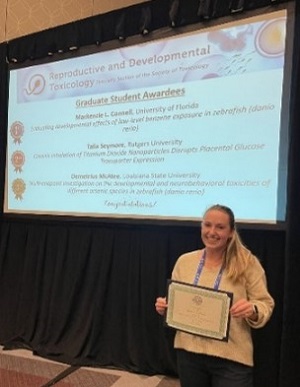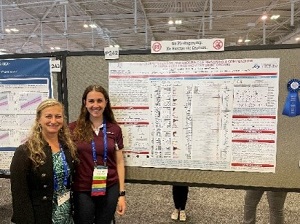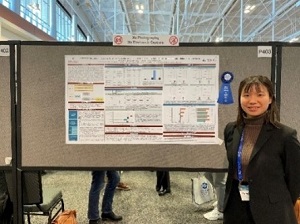Superfund Research Program
April 2023
By Maggie Wiener
NIEHS Superfund Research Program (SRP)-funded scientists from across the country gathered in person for the 2023 Society of Toxicology (SOT) Annual Meeting to share their research and exchange ideas. Held March 19 - 23 in Nashville, Tennessee, the 62nd SOT meeting and ToxExpo drew more than 5,000 attendees who gave more than 2,000 presentations and participated in more than 70 sessions.
Among the scientific sessions, SRP Health Scientist Administrator Danielle Carlin, Ph.D., organized and chaired a workshop along with Sanjay Srivastava, Ph.D., of the University of Louisville SRP Center on current perspectives on environmental chemicals and their role in cardiovascular disease.
SRP Trainees Recognized



Many SRP trainees were recognized for their achievements during the meeting.
- Mackenzie Connell, Wayne State University SRP Center, won first place in the graduate poster competition for the Reproductive and Developmental Toxicology Specialty Section.
- Haley Moyer, Texas A&M University (TAMU), received the Perry J. Gehring Best Graduate Student Abstract Award.
- Meichen Wang, Ph.D., TAMU, won the Stratacor Postdoctoral Award.
- Kelly Rivenbark, TAMU SRP Center, received the Best Abstract for a Graduate Student Award.
- Alexandra Cordova, TAMU SRP Center, received the Perry J. Gehring Risk Assessment Student Award Fund.
- Eva Vitucci, Ph.D., of the TAMU SRP Center, received the Sheldon D. Murphy Memorial Fund and Molecular and Systems Biology Student Award Fund.
- Lucie Ford, TAMU, won the award for Top 10 Best Published Paper Advancing the Science of Risk Assessment and the John Doull Risk Assessment Endowment Award.
- Avinash Kumar, Ph.D., Louisiana State University, was awarded the Dharm V. Singh Association of Scientists of Indian Origin Student Award Fund.
- En-Hsuan Lu, TAMU SRP Center, won the Top 10 Risk Assessment Abstract Award.
- Jamie Young, Ph.D., University of Louisville SRP Center, won the Celebrating Women in Toxicology Award Fund.
- Amanda Armijo, Ph.D., Massachusetts Institute of Technology (MIT), received the Roger O. McClellan Student Award Fund.
- Subham Dasgupta, Ph.D., a former trainee at the Oregon State University (OSU) SRP Center, won the Molecular and Systems Biology Student Award Fund and the Pacific Northwest Toxicology Development Fund.
- Hao Wang, Ph.D., University of Washington, received the Gabriel L. Plaa Education Award Fund.
- Krystal Taylor, of East Carolina University and a trainee with the North Carolina State University (NCSU) SRP Center, was awarded the Diversity Initiatives Fund.
- Rachel Speer, Ph.D., University of New Mexico, received the Metals Specialty Section Student Research Award Fund.
- Lindsay Wilson, OSU SRP Center, won the Molecular and Systems Biology Student Award Fund.
- Yvonne Rericha and Lindsey St. Mary, Ph.D., OSU SRP Center, both won the Pacific Northwest Toxicology Development Fund.
- Aggie Williams, at the University of Louisville, received the Environmental Carcinogenesis Merit Award for Graduate Students.
- Ya'u Adamu, of the University of Iowa, won the Three-Minute Thesis Award from the Regulatory and Safety Evaluation Specialty Section.
- Haoduo Zhao, University of North Carolina at Chapel Hill, received the 2023 Best Abstract Award from the Exposure Specialty Section.
- Karina Orlowska, of the Michigan State University (MSU) SRP Center, won the Molecular and Systems Biology Specialty Section Paper of the Year and received the first place poster award.
- Giovan Cholico, MSU SRP Center, received an Honorable Mention from the Hispanic Organization of Toxicologists Special Interest Group for his presentation.
SRP-Funded Researchers Honored at SOT
Several SRP-funded researchers received awards at SOT for their collaborations, mentorship, publications, and research. Pawel Lorkiewicz. Ph.D., and Dan Conklin, Ph.D., of the University of Louisville SRP Center were awarded the SOT Exposure Specialty Section Best Paper Award. According to the reviewers, their paper, titled "Electronic Cigarette Solvents, JUUL E-Liquids, and Biomarkers of Exposure: In Vivo Evidence for Acrolein and Glycidol in E-Cig-Derived Aerosols," provides an excellent illustration of the importance of exposure science and helps to underscore the mission and objectives of the specialty section.
Theodore Slotkin, Ph.D., and Edward Levin, Ph.D., of the Duke SRP Center had a paper selected as a Toxicological Sciences Paper of the Year Award. Their publication looked at the effects of paternal cannabis exposure prior to mating on neurodevelopment of offspring.

OSU SRP Center Director Robyn Tanguay, Ph.D., received the prestigious SOT Toxicology Mentoring Award. Tanguay was recognized for her commitment to mentoring and for helping advance the careers of many toxicologists with her advice and counsel. For the past two decades, she has trained more than 90 toxicologists, including undergraduates, graduate students, and postdoctoral researchers.
Lisa Truong, Ph.D., a researcher at the OSU SRP Center was awarded the 2023 JOINN Biomere Outstanding Young Toxicologist Award of the Association of Chinese Toxicology. She works with Tanguay to predict the toxicity of complex polycyclic aromatic hydrocarbon mixtures.
Jamie Dewitt, Ph.D., of East Carolina University and co-investigator with the NCSU SRP Center, received the Public Communication Award. Her work over the last 15 years in emerging contaminants has helped her inform policy and communities by translating foundational science so that it can be applied to state and federal health guidelines. In her research at NCSU, she has also examined the effects of legacy per-and polyfluoroalkyl substances and newer GenX compounds that affect the Cape Fear River in North Carolina.

Kjersti Aagaard, M.D., Ph.D., of the Baylor College of Medicine SRP Center won the SOT Translational Impact Award. Aagaard was recognized for her achievements in revealing the underlying molecular mechanisms that link environmental and nutritional exposures during pregnancy and early development to later childhood and adult disease. Her work has significantly contributed to the understanding of the mechanisms underlying the developmental origins of health and disease.
MIT SRP Center Director Bevin Engelward, Sc.D., received the 2023 SOT Education Award for her leadership in the lab, classroom, and the field. Engelward serves as a mentor to SRP trainees who learn about chemical contamination problems associated with Superfund sites, and the ways that researchers are helping to find solutions to these public health challenges.
For a complete list of winners, see the SOT 2023 Awards listing.
For more information about NIEHS at SOT, see the Environmental Factor article.


